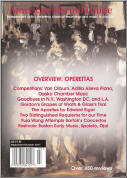Reviewer: John
W. Barker
Librettists and composers have
been drawn, almost from the origins of opera, to the story of Armida (Armide)
as told by Tasso in his Gerusalemme Liberata: the Saracen sorceress who
enchants and distracts the crusader hero Rinaldo (Renaud), actually falling
in love with him, but then losing him to the call of duty when he comes to
his senses. Lully’s setting of the story was among the earlier ones, if by
no means the earliest. It dates from 1686, a year he died, and served as the
crown on his creation of the French tragedie lyrique. With his librettist,
Philippe Quinault, Lully short-changed the details of the Armida-Rinaldo
alliance and concentrated strongly on Armida herself and the terrible
ambivalences she suffered. Should she kill this Christian warrior who was
her enemy, or should she succumb to her attraction to him? How can she cope
with his seemingly quick disenchantment and determination to leave her? (For
his part, how does he deal with his rediscovery of duty and his sympathy for
her abject state?) As first represented in the Prologue, the story is
plainly characterized as the triumph of duty over love. (At the same time,
Act IV—too often cut or reduced—is supplied for comic relief, as two of
Renaud’s buddies cope with magical obstacles.)
This is the opera’s fourth recording. Of the predecessors, the most recent
was one organized by Ryan Brown with Opera Lafayette (Naxos 660209, 2CD: M/A
2009). His cast of young singers, mostly American, sing a creditable
performance, with Brown working hard at creating a French Baroque sound. But
needless cuts were imposed, and that effort was just not up to the standards
of two earlier recordings, both led by Philippe Herreweghe. His first
recording was released in 1984 by Erato (not reviewed): though highly
artistic, it was marred by heavy cuts. He returned to the opera for a staged
production in 1992, and a byproduct of that was his second recording (Harmonia
Mundi 901456; S/O 1993). That recording was a superlative example of
stylishness and dramatic strength, with a starry cast led by Guillemette
Laurens, Howard Crook, Veronique Gens, Bernard Deletre, and Giles Raglan. As
a supplement to the audio history, there is a video documentation of a 2008
staged production under William Christie (Fra 7: N/D 2011). That performance
is superlatively artistic and idiomatic, but things are ruined by William
Carsons’s utterly reprehensible staging. If only the audio dimension could
be issued on CD we would have a really important competitor.
The second Herreweghe
recording becomes the yardstick, but it is deleted for now.
Rousset, absolutely no slouch in French Baroque music, may be the one to get
as of now. His recording competes head-on with Herreweghe II and achieves an
impressive parity. The role of Armide is a wonderful vehicle for
histrionics, and its previous portrayers have all been striking. With a dark
soprano coloring, Henry can convey powerfully the range and depths of
Armide’s emotions, sometimes verging on hysteria; it is a gripping
characterization. Surpassing Herreweghe’s Crook, Figueroa offers a lean
tenor sound very much in the French mode and suggests a true hero out of his
normal world. Auvity and Bazola are fine as the clumsy buddies. Mauillon is
scary as the foiled meanie Hatred (La Haine). Though I have not listed them
above, I must commend sopranos Judith van Wanroij and Marie-Claude Chappuis,
who sing elegantly a number of small roles—there are 14 roles in all. The
chorus of 20 and the orchestra of 28 make strong and satisfying
contributions. Rounding out the admirable musical dimensions is a handsome
package, in boundbook album, with good notes and full French libretto with
English translation.
Fermer la fenêtre/Close window
|




